From Sweet to Superfood: The Hidden Health Perks of Bell Peppers
Published: May 20, 2025 at 11:09:48 AM UTC
Last updated: December 24, 2025 at 12:44:49 PM UTC
Bell peppers, also known as sweet peppers or capsicums, are vibrant fruits. They come from Central and South America. These colorful veggies are low in calories but full of vitamins, like vitamin C and antioxidants. They range in color from green to bright red. Bell peppers are great in many dishes, both raw and cooked. Let's dive into the health perks of eating bell peppers, backed by science and nutrition.
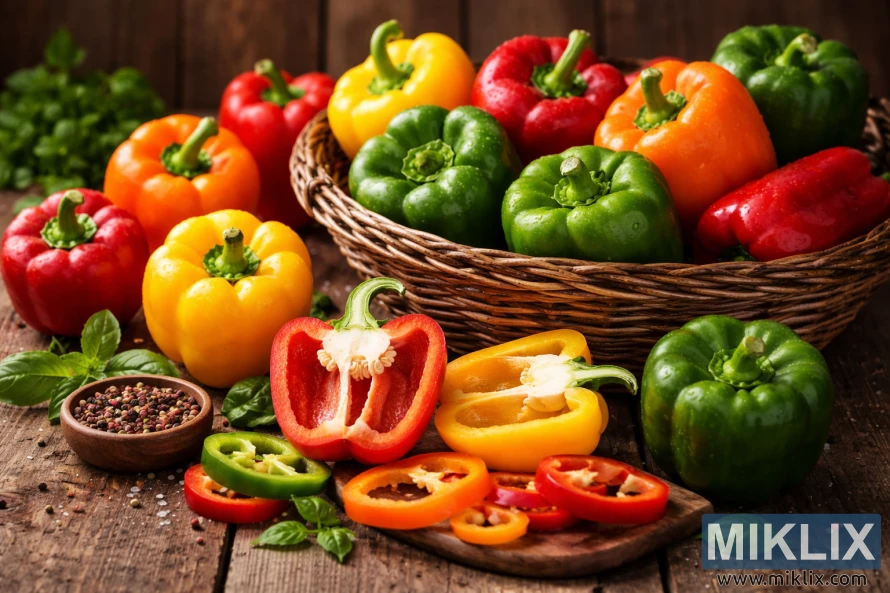
Key Takeaways
- Bell peppers are low in calories and high in essential vitamins.
- These vegetables are rich in antioxidants, promoting overall health.
- Consuming bell peppers can support eye and skin health.
- They play a role in boosting immune function.
- Incorporating bell peppers into meals can aid in weight management.
Introduction to Bell Peppers
Bell peppers add a burst of color and crunch to many dishes. They are known as Capsicum annuum and come in green, red, yellow, and orange. These fruits bring flavor and nutrition to our meals.
People often think of bell peppers as vegetables, but they are actually fruits. They are loved worldwide and are great in salads, stir-fries, and fajitas. You can even dry them to make paprika, a favorite spice.
Learning about bell peppers helps us see their health benefits. Their origins and types make them popular in many cuisines.
Nutritional Profile of Bell Peppers
Bell peppers are packed with nutrients, making them great for any diet. A medium red bell pepper, about 119 grams, has just 31 calories. They also have 7 grams of carbs, 1 gram of protein, and no fat. This makes them perfect for healthy snacks or meals.
Bell peppers are known for their vitamin C content. Half a cup gives you more than 100% of your daily vitamin C needs. They also have vitamins A, K, and B6.
- Vitamin A
- Vitamin K
- Vitamin B6
Bell peppers are also rich in minerals like potassium and folate. These minerals are good for your health. They have a lot of water, about 92%, and 3 grams of fiber. This makes them a low-calorie food that helps with digestion and keeps you full.
Antioxidant Properties of Bell Peppers
Bell peppers are packed with antioxidants, like beta carotene and lutein. These help fight off free radicals. Free radicals can harm our cells and lead to diseases.
The bright colors of bell peppers show they're full of good stuff. Red bell peppers, for example, have capsanthin. This antioxidant is great for our health. Eating bell peppers can lower inflammation and keep us healthy.
Eating bell peppers boosts your antioxidant levels. This helps your body fight off damage. Adding these veggies to your meals can make you healthier and stronger against harmful substances.
Health Benefits of Bell Peppers
Eating bell peppers can make your meals healthier. Their bright colors show they're full of nutrients. Eating them often might lower your risk of heart disease and some cancers.
Bell peppers are packed with vitamin C, which boosts your immune system. This vitamin fights off sicknesses, making them a smart choice for a healthy diet. The antioxidants in bell peppers also reduce inflammation and protect against damage, adding to their health perks.
Also, bell peppers are rich in dietary fiber, which is good for your digestion. This fiber keeps your gut healthy, improving your overall well-being. You can enjoy them raw in salads or cooked in many dishes, making them a tasty way to get healthier.
Eye Health and Bell Peppers
Bell peppers are packed with lutein and zeaxanthin, two antioxidants that are great for your eyes. They help protect the retina from damage caused by oxidative stress. This can prevent conditions like macular degeneration. Eating bell peppers can help keep your vision sharp, even as you get older.
Studies show that eating bell peppers regularly can lower the risk of cataracts. It also boosts your overall eye health. This is good news for people who spend a lot of time in front of screens or are exposed to blue light. The carotenoids in bell peppers are key to keeping your eyes working well.
Boosting Immune Health with Bell Peppers
Bell peppers are great for your diet if you want to boost your immune health. A medium red bell pepper has 190% of the daily vitamin C you need. Vitamin C helps your body fight off infections and heal wounds.
Vitamin C also fights oxidative stress, which can help prevent chronic diseases. Eating bell peppers can help keep you healthy, even when colds and flu are around. Their bright colors mean they're packed with nutrients that are good for you.
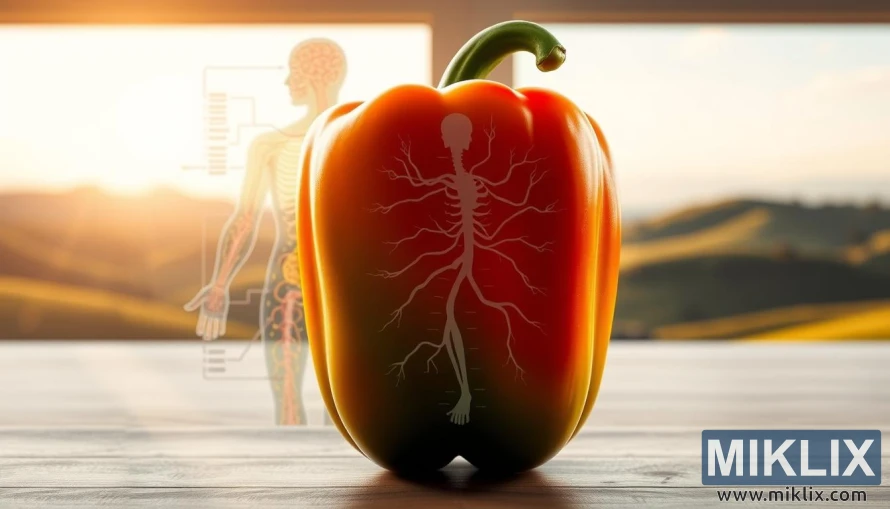
Benefits for Skin Health
Bell peppers are great for your skin, thanks to vitamins A and C. These vitamins help make collagen, which keeps your skin elastic. This means your skin looks younger and less wrinkled.
Bell peppers also have antioxidants. These fight off damage from the sun and pollution. Eating bell peppers often can make your skin look better and feel more alive.
Bell Peppers and Gut Health
Bell peppers are not just colorful and tasty. They also help a lot with gut health. They are full of dietary fiber, which is good for your digestive system. This fiber helps keep your gut healthy and working right.
Adding bell peppers to your meals can bring many benefits:
- They improve digestion because of their fiber.
- They help keep the good bacteria in your gut healthy.
- They might even lower bad cholesterol, which is good for your health.
It's easy to add more fiber to your diet with bell peppers. You can put them in salads, stir-fries, or just eat them as a snack. They help with digestion and make your gut healthier. So, they're a great choice for your meals.
Bell Peppers in Weight Management
Bell peppers are key in managing weight because they are low in calories but high in fiber. They are among the best low-calorie veggies. This means they can make meals feel more filling without adding too many calories.
This helps people feel less hungry and less likely to snack on unhealthy foods. It's a smart way to keep your diet on track.
Adding bell peppers to meals can also make them more exciting. Their bright colors and crunchy texture can brighten up salads, stir-fries, and wraps. This makes it fun to eat healthy while working towards your weight goals.
There are many ways to cook bell peppers, so they can be a part of many tasty meals. They bring important nutrients and a satisfying crunch to your diet. This helps support your health and keeps your weight in check.
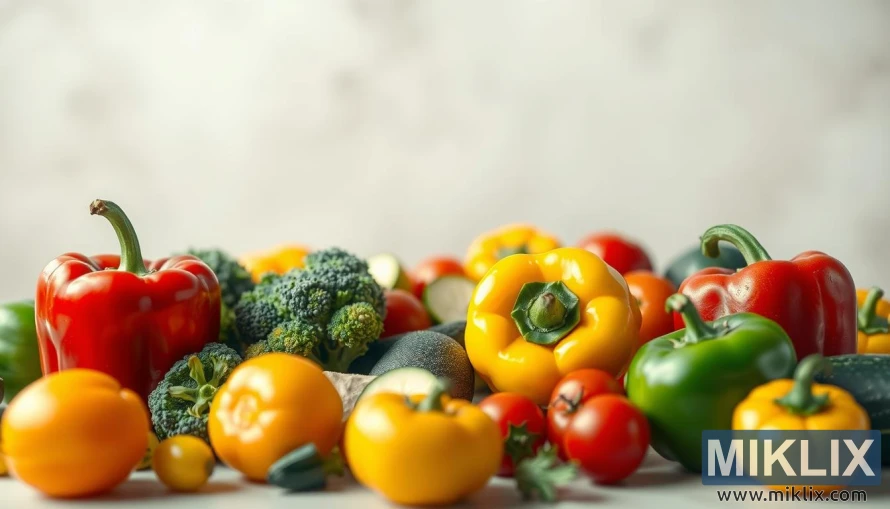
Risks and Considerations When Eating Bell Peppers
Bell peppers are full of nutrients and can be used in many ways. But, some people might have allergies or sensitivities to them. Those with oral allergy syndrome might react to bell peppers because of pollen. It's key to know how your body reacts to enjoy them safely.
Bell peppers are part of the nightshade family, like tomatoes and eggplants. Some people, with known sensitivities, might get stomach problems or inflammation from eating these veggies.
To avoid any problems, here are some tips:
- Watch for signs of an allergic reaction, like itching or swelling in the mouth.
- If you get stomach issues after eating bell peppers, try eating less or avoiding them.
- Talk to a doctor to figure out what's best for your diet, making sure you get all the nutrients you need.
How to Include Bell Peppers in Your Diet
Adding bell peppers to your meals is easy and fun. You can eat them raw, which is great for salads or as a colorful addition to any dish. Try dipping bell pepper slices in hummus for a tasty snack.
For a heartier meal, fill bell peppers with grains, proteins, or cheese. This makes for a satisfying dinner.
Cooking bell peppers brings out their natural sweetness. Roasting, grilling, or sautéing them enhances their flavor. They're perfect for stir-fries or pasta dishes, adding exciting textures and tastes.
There are countless ways to enjoy bell peppers. Add diced bell peppers to omelets for a nutritious breakfast. Or, mix them into a fresh salsa for a burst of flavor. Including these vibrant veggies in your diet offers great taste and health benefits.
Buying and Storing Bell Peppers
When buying bell peppers, look for firm, smooth-skinned ones. Make sure they have no damage or soft spots. A fresh pepper will be heavy and have bright colors, showing it's fresh.
After buying, store them right to keep them fresh longer. Put them in the fridge in a plastic bag. This keeps them crisp. Try to use them within five days for the best taste and health benefits.
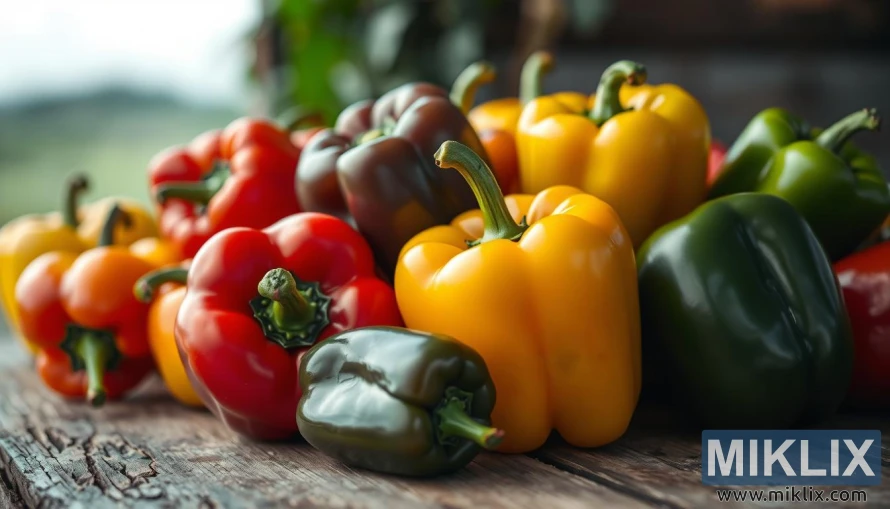
Cooking Techniques for Bell Peppers
Bell peppers can be enjoyed in many ways, showing off their bright colors and tastes. Each cooking method makes them taste better and adds to their health benefits. Here are some common ways to prepare them:
- Roasting: This method brings out the natural sweetness of bell peppers, giving them a rich caramel flavor.
- Grilling: Grilling adds a smoky taste, great for summer barbecues.
- Sautéing: Sautéing is quick and keeps bell peppers tender and colorful.
- Frying: Frying gives bell peppers a crispy texture, perfect for dishes like fajitas.
For meal prep, bell peppers are great in stir-fries or as a fresh addition to salads. They keep their vitamin C levels high when eaten fresh. Trying these cooking methods can make your meals better and keep you healthy.
Exploring Different Varieties of Bell Peppers
Bell peppers come in a wide range of colors, each with its own unique taste. The color of a pepper often shows how ripe it is. This makes cooking with them even more fun.
Green bell peppers are not yet ripe. They have a slightly bitter taste that can add a special touch to dishes. But, red, yellow, and orange peppers are sweeter and more flavorful. They're perfect for salads, stir-fries, and roasting.
Each color of bell pepper has its own health benefits. For example, red peppers have more antioxidants than green ones. This makes them not only delicious but also good for you. Mixing different colors can also make your meals more exciting.
Next time you're cooking, try using different bell pepper varieties. Their colors and tastes can really make your dishes stand out.
Conclusion
Bell peppers are packed with nutrients, making them great for your health. They are full of vitamins, antioxidants, and fiber. Eating bell peppers can boost your immune system, improve your eyes, and make your skin look better.
They also help with weight management. This is because they make you feel full without adding too many calories. This is good news for anyone trying to eat healthier.
Bell peppers are easy to use in many recipes. You can add them to salads, roast them as a side, or mix them into sauces. Their bright colors and flavors can make any meal more exciting.
By adding bell peppers to your diet, you get lots of benefits. They are a key part of a healthy diet. They make your meals more interesting and nutritious.
Make bell peppers a regular part of your meals. They are not just good for you; they also add a nice crunch to your food. Enjoy the many health benefits they offer.
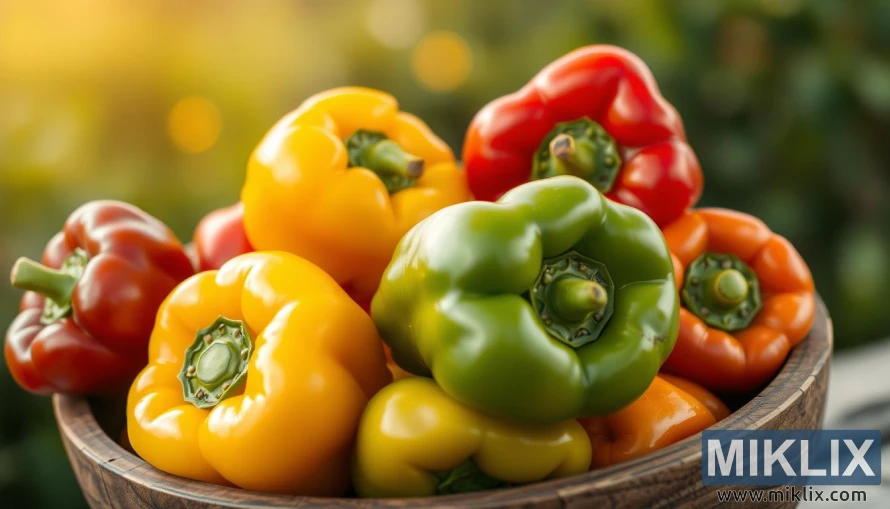
Further Reading
If you enjoyed this post, you may also like these suggestions:
- Kimchi: Korea’s Superfood with Global Health Benefits
- From Potassium to Prebiotics: The Banana's Hidden Health Boosters
- Beyond Pie: The Nutritional Power of Pecans You Didn’t Know
